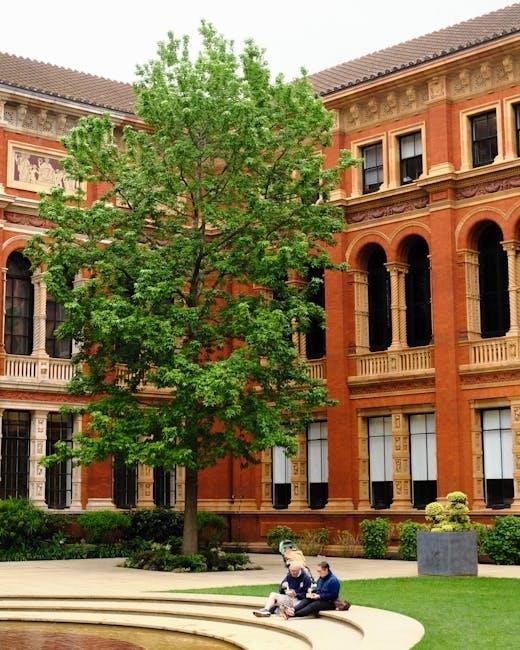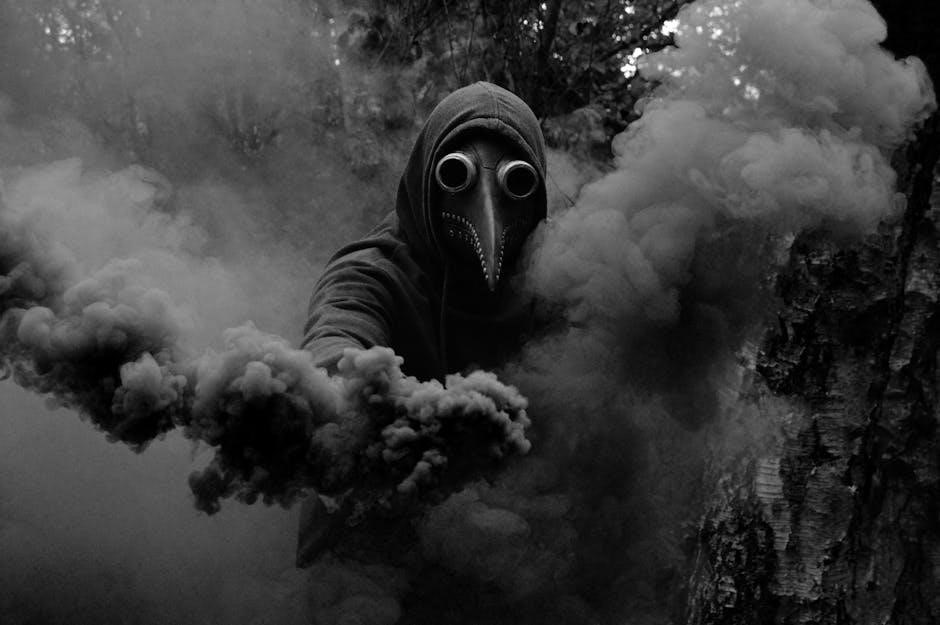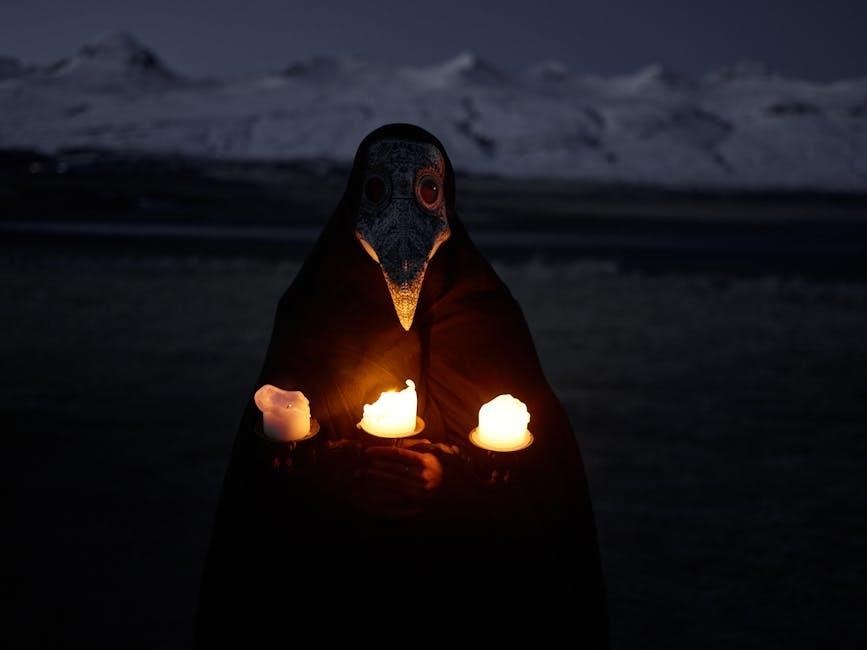Albert Camus, a renowned philosopher and novelist, published The Plague in 1947, exploring a devastating epidemic in Oran, Algeria, and delving into themes of destiny, suffering, and the human condition through his concept of the absurd․
1․1․ Brief Biography of Albert Camus
Albert Camus was born on November 7, 1913, in Dréan, Algeria, to a poor working-class family․ His father died in World War I, and he grew up in poverty․ Camus contracted tuberculosis in his late teens, impacting his career․ He became a renowned philosopher and writer, known for his concept of the ‘absurd․’ His notable works include ‘The Stranger’ and ‘The Plague․’ Camus was involved in the French Resistance and won the Nobel Prize in Literature in 1957; His philosophical views significantly influenced 20th-century thought․ He died in a car accident on January 4, 1960․
1․2․ Historical Context of The Plague
The Plague, written during World War II, reflects Camus’s experiences and philosophical views shaped by the war․ The novel serves as an allegory for the Nazi occupation of France, with the plague symbolizing the invasion and the resilience of the human spirit․ Camus’s involvement in the French Resistance deeply influenced the novel’s themes of rebellion and solidarity․ Published in 1947, it captured the post-war existential crisis, resonating with a world grappling with despair and hope․
1․3․ The Plague as a Philosophical Novel
The Plague is a seminal philosophical novel exploring Camus’s concept of the absurd, where humanity confronts an indifferent universe․ Through the characters’ struggles, Camus examines existential themes like suffering, rebellion, and solidarity․ The novel transitions his philosophy from absurdity to rebellion, emphasizing ethical responsibility․ It questions destiny, urging individuals to find meaning amidst chaos, reflecting Camus’s belief in resilience and moral commitment despite life’s inherent contradictions and hardships․

Plot Summary of The Plague
Set in Oran, Algeria, The Plague by Albert Camus narrates a community’s struggle against a deadly epidemic, exploring themes of resilience, sacrifice, and the human condition amidst despair․
2․1․ Setting: The City of Oran
The story unfolds in Oran, a French Algerian port city, which is struck by a mysterious and deadly plague․ The city’s isolation and lack of preparedness exacerbate the crisis, transforming it into a symbol of human vulnerability․ The setting reflects Camus’s exploration of confinement, both physical and existential, as the characters confront their mortality and the meaninglessness of their situation․ Oran becomes a microcosm of human suffering and collective resilience․
2․2․ The Outbreak of the Plague
The plague begins with the sudden appearance of dead rats in the streets of Oran, followed by a rapid rise in human casualties․ Initially dismissed as insignificant, the outbreak escalates, overwhelming the city’s medical resources․ Panic spreads as the true scale of the epidemic becomes clear, forcing the authorities to quarantine Oran․ The plague’s swift and merciless progression creates a climate of fear and uncertainty, highlighting the fragility of human life and societal structures;
2․3․ Key Characters and Their Roles
Dr․ Bernard Rieux, a dedicated physician, leads the fight against the plague, embodying resilience and moral responsibility․ Jean Tarrou, a mysterious visitor, joins Rieux, seeking redemption and meaning․ Father Paneloux, a priest, interprets the plague as divine punishment, while Cottard exploits the chaos for personal gain․ Grand, a clerk, struggles with his own mortality, symbolizing ordinary humanity’s resilience․ Together, these characters illuminate the novel’s themes of suffering, solidarity, and the human condition․
Major Themes in The Plague
The novel explores the absurd, human suffering, and rebellion, emphasizing solidarity and resilience in the face of catastrophic events, reflecting Camus’s philosophical views on existence and morality․
3․1․ The Absurd and Human Suffering
Camus’s concept of the absurd is central to The Plague, where the meaninglessness of suffering is juxtaposed with human resilience․ The novel portrays the futility of seeking rational explanations for the plague, highlighting the inherent absurdity of human existence․ Through Dr․ Rieux’s unwavering commitment to his patients, Camus illustrates how individuals confront the absurd by perpetuating compassion and hope amidst chaos, underscoring the paradox of human suffering and the search for meaning in a seemingly indifferent world․
3․2․ Rebellion Against Injustice
Camus’s The Plague explores rebellion as a moral response to injustice, reflecting his involvement with the French Resistance․ The novel depicts collective resistance against the plague’s oppressive grip, symbolizing defiance against systemic oppression․ Characters like Dr․ Rieux and Tarrou embody rebellion through their unwavering commitment to aiding the afflicted, rejecting indifference and despair․ Camus highlights how rebellion, even in the face of futility, becomes a profound act of humanity, challenging the inevitability of suffering and asserting the dignity of life․
3․3․ Solidarity and Human Resilience

In The Plague, Camus underscores the power of solidarity as a counter to despair․ Amidst the epidemic, ordinary citizens rise to help one another, transcending selfishness․ The novel portrays how shared suffering fosters collective resilience, as seen in the selfless efforts of Dr․ Rieux and the volunteers․ Camus suggests that even in the darkest times, human unity and compassion can create meaning, offering hope beyond individual survival and revealing the strength found in communal struggle against adversity․

Philosophical Insights
The Plague delves into existential themes, highlighting Camus’s concept of the absurd and humanity’s search for meaning amidst suffering, while exploring moral dilemmas and the societal role of medicine․
4․1․ Camus’s Concept of the Absurd
Camus’s concept of the absurd, central to his philosophy, is vividly illustrated in The Plague․ The novel portrays the absurd as humanity’s struggle to find meaning in a seemingly indifferent and chaotic world․ The plague itself serves as a metaphor for the absurd, symbolizing the unpredictability and cruelty of fate․ Through the characters’ experiences, Camus explores how individuals confront the absurd, emphasizing resilience, solidarity, and the search for dignity in the face of existential despair and suffering․
4․2․ Moral and Ethical Dilemmas
In The Plague, Camus explores profound moral and ethical dilemmas through characters’ responses to the epidemic․ Dr․ Rieux’s selfless dedication to his patients reflects a strong moral compass, while Father Paneloux’s religious justifications for the plague provoke ethical debates․ The novel questions the morality of isolation, sacrifice, and survival, highlighting the tension between individual and collective responsibility․ These dilemmas resonate universally, challenging readers to reflect on their own values and humanity in the face of catastrophe․
4․3․ The Role of Medicine in Society
In The Plague, Camus examines the role of medicine in society through Dr․ Rieux’s relentless efforts to combat the epidemic․ The novel highlights medicine’s limitations and the ethical challenges faced by healthcare providers․ While Rieux embodies a commitment to healing and solidarity, the plague’s uncontrollable spread underscores the fallibility of medical science․ Camus portrays medicine as both a vital force and a humbling reminder of human vulnerability, emphasizing its role in fostering resilience and unity amid societal crises․

Symbolism in The Plague
Camus uses the plague as a symbol of the absurd, chaos, and societal collapse․ The isolated city of Oran represents confinement, while death and suffering embody human vulnerability and resilience․
5․1․ The Plague as a Metaphor

The plague in Camus’s novel serves as a powerful metaphor for the absurdity of human existence and the inevitability of suffering․ It symbolizes existential crises, societal collapse, and the universal human experience of confronting death and meaninglessness․ Through this metaphor, Camus explores themes of resilience, solidarity, and the search for meaning in a seemingly indifferent world․ The plague transcends its literal form, becoming a profound allegory for the human condition and the struggle against adversity․
5․2․ The Isolated City of Oran
The city of Oran, portrayed as isolated and disconnected from the outside world, becomes a central symbol in Camus’s narrative․ Its physical confinement due to the plague mirrors the emotional and psychological isolation of its inhabitants․ The sealed gates and cut-off communication amplify the sense of despair and entrapment, forcing the characters to confront their mortality and the meaning of their existence․ Oran’s isolation serves as a microcosm for human experience during crises, highlighting themes of solidarity and resilience in the face of adversity․
5․3․ The Symbolism of Death and Suffering
Death and suffering in The Plague transcend literal meaning, becoming profound symbols of existential inquiry․ The relentless spread of the disease embodies the inevitability and mystery of death, challenging human understanding․ Camus uses suffering to explore themes of absurdity, resilience, and solidarity, ultimately revealing the strength of human spirit amidst unimaginable pain․ The novel’s somber tone and vivid descriptions of suffering underscore the universality of human experience and the moral dilemmas faced during crises․
The Plague and COVID-19: Modern Relevance
The parallels between Camus’s The Plague and the COVID-19 pandemic are striking, offering timeless insights into human resilience and societal responses to crises, resonating deeply today․

6․1․ Parallels Between the Novel and the Pandemic
The COVID-19 pandemic drew stark comparisons to Camus’s The Plague, as both depict societal responses to unseen threats․ The novel’s themes of isolation, collective suffering, and resilience resonate deeply with modern experiences․ Camus’s exploration of fear, solidarity, and the human condition offers timeless insights, mirroring the global struggle against the virus․ The parallels highlight the enduring relevance of Camus’s work in understanding crises and the universal human response to adversity․
6․2․ Social and Psychological Effects
The plague in Camus’s novel triggers profound social and psychological shifts, mirroring the COVID-19 pandemic’s impact․ Society isolates, economies falter, and fear dominates, leading to widespread anxiety and despair․ Camus’s depiction of collective trauma and individual desperation resonates with modern experiences of lockdowns and uncertainty․ The novel underscores the importance of empathy and solidarity in navigating crises, offering timeless insights into humanity’s capacity to endure and adapt in the face of adversity․
6․3․ Lessons from Camus’s Work
Camus’s The Plague offers enduring lessons on resilience, solidarity, and moral responsibility․ The novel highlights the absurdity of human suffering while emphasizing the importance of collective action and compassion․ It teaches us to confront crises with dignity, challenging indifference and fostering hope․ Camus’s exploration of rebellion against injustice and the pursuit of meaning in adversity remains deeply relevant, inspiring readers to reflect on their values and humanity in the face of uncertainty and disaster․

Downloading The Plague in PDF Format
The Plague by Albert Camus is widely available in PDF format for free download on platforms like PDFDrive or Internet Archive, offering easy access to this timeless novel․

7․1․ Free PDF Downloads and Availability
The Plague by Albert Camus is widely available for free download in PDF format on platforms such as PDFDrive, Internet Archive, and other digital libraries․ Users can access the novel without registration or payment, making it easily accessible for readers worldwide․ The PDF versions include various translations and editions, ensuring a broad reach․ This accessibility has made the novel a popular choice for study and personal reading, especially during recent global events that drew parallels to the story․
7․2․ Translations and Editions

The Plague is available in multiple translations, with notable versions by Laura Marris and Stuart Gilbert, ensuring accessibility to diverse readers․ The novel has been published in various editions, including the 1948 first American edition and modern reprints․ These translations and editions maintain the original philosophical depth while offering readers different interpretative perspectives, making Camus’s work timeless and universally relevant․ The availability of these versions ensures the novel remains accessible to a global audience․
7․3․ Accessing the Book for Study
The Plague is widely available in PDF format, with free downloads accessible on platforms like PDFdrive․to and Internet Archive․ Readers can also purchase e-book versions from major retailers․ For academic purposes, libraries often provide access through digital databases․ Ensuring the use of authorized sources guarantees quality and supports the author’s legacy․ This accessibility makes Camus’s timeless exploration of human resilience and absurdism readily available for scholarly analysis and personal reflection․
Study Guides and Critical Essays
Study guides and critical essays on The Plague offer in-depth analysis of themes, characters, and philosophical insights, providing valuable resources for academic exploration and essay writing․
8․1․ Analyzing the Novel’s Structure
The Plague by Albert Camus is structured chronologically, tracing the outbreak, spread, and decline of the epidemic in Oran․ The narrative flows through multiple perspectives, blending individual experiences with collective suffering․ Camus uses this framework to explore themes of absurdity, rebellion, and solidarity․ The novel’s structure mirrors the progression of the plague itself, reflecting the societal and psychological transformations it provokes․ Key characters like Dr․ Rieux and Tarrou embody these themes, offering moral and philosophical depth to the story․
8․2․ Critical Perspectives on The Plague
Critics have interpreted The Plague as an allegory for human resilience against oppression․ Scholars highlight Camus’s use of the plague to explore existential themes, while others emphasize its reflection of historical events like the Nazi occupation․ The novel’s moral complexities, such as the role of medicine and individual responsibility, are central to critical analyses․ Its enduring relevance, particularly during crises like the COVID-19 pandemic, underscores its universal appeal and depth․
8․3․ Essay Topics and Discussion Points
Essay topics on The Plague include analyzing the theme of the absurd, exploring Dr․ Rieux’s moral stance, and discussing the novel’s allegorical connection to the COVID-19 pandemic․ Other points include the role of solidarity, the symbolism of Oran’s isolation, and the ethical dilemmas faced by characters․ Students can also examine how Camus portrays human resilience and the psychological impact of epidemics․ These topics encourage deeper exploration of the novel’s philosophical and societal relevance․
The Plague and Its Cultural Impact
The Plague became a cultural phenomenon, resonating deeply during the COVID-19 pandemic․ Its exploration of human resilience and societal response cemented its status as a timeless classic․
9․1․ Reception Upon Publication
The Plague received widespread acclaim upon its release in 1947, praised for its profound exploration of human resilience and moral dilemmas․ Critics lauded Camus’s ability to blend philosophy with gripping narrative, making the novel a literary triumph․ It sold millions of copies worldwide and was translated into numerous languages, solidifying its status as a modern classic․ The book’s themes of collective suffering and solidarity resonated deeply, establishing it as a cultural touchstone during and beyond the post-war era․
9․2․ Influence on Literature and Philosophy
The Plague profoundly influenced existentialist thought and literary movements, shaping philosophical discourse on absurdism and human resilience․ Camus’s exploration of moral resistance and collective suffering inspired writers and thinkers globally․ The novel’s themes of absurdity and rebellion bridged philosophy and fiction, impacting post-war intellectual movements and fostering deeper sociopolitical reflection in literature․ Its legacy continues to resonate, influencing contemporary discussions on ethics, solidarity, and humanity’s response to crises․
9․3․ Adaptations and Interpretations
The Plague has been widely adapted and reinterpreted in various forms of media and scholarly works; Its themes of resilience and moral struggle have inspired films, plays, and literary analyses․ The novel’s allegorical nature, often linked to the French Resistance, has fostered deep philosophical interpretations․ Translations, such as Laura Marris’s rendition, have revitalized its accessibility, while authors like Kevin Chong have drawn inspiration from its narrative․ These adaptations underscore the novel’s enduring relevance and universal appeal․
Albert Camus’s The Plague remains a timeless exploration of absurdism, human resilience, and moral courage, offering profound insights into suffering and solidarity, inspiring readers universally․
10․1․ The Timeless Relevance of The Plague
The Plague by Albert Camus remains enduringly relevant, offering profound reflections on human behavior, solidarity, and resilience during crises․ Its exploration of absurdism, suffering, and moral courage resonates across generations, particularly in the face of modern challenges like the COVID-19 pandemic․ The novel’s themes of collective struggle and hope continue to inspire, making it a timeless allegory for understanding humanity’s response to adversity and the enduring quest for meaning in a chaotic world․
10․2․ Final Thoughts on Camus’s Legacy
Albert Camus’s legacy is cemented through The Plague, a work that transcends time, offering insights into humanity’s resilience and moral dilemmas․ His philosophical exploration of absurdism and rebellion continues to influence literature and philosophy․ Camus’s ability to weave profound truths into a compelling narrative ensures his ideas remain relevant, guiding readers to reflect on their own responses to suffering and injustice, thus solidifying his place as a literary and philosophical giant․
10․3․ Encouragement to Read the Novel
Reading The Plague offers a profound exploration of human resilience, solidarity, and the search for meaning amidst suffering․ Camus’s vivid portrayal of Oran under siege invites readers to reflect on universal themes that remain strikingly relevant today․ The novel’s timeless wisdom, coupled with its accessibility in PDF formats, makes it an essential read for anyone seeking to understand the human condition and the enduring legacy of Albert Camus’s philosophical insights․

No Responses